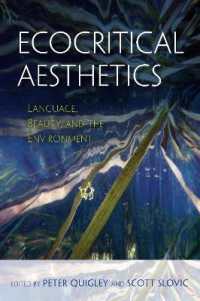- ホーム
- > 洋書
- > 英文書
- > Architecture
基本説明
Leading thinkers from architecture, history, philosophy, planning science, and technology advocate a practical and pluralist approach to environmental and social change. It provides an essential understanding of how we might meet the challenge of sustainability.
Full Description
Though many disciplines have been advocating the need to create a world which is sustainable, too often the theories and ideas are discipline specific and too narrow for comprehensive adoption. The authors of this book - all leading thinkers in their fields - instead propose a more general way of thinking, a pragmatic and pluralistic approach. Rather than suggesting a single solution to the problem of how to live sustainably, this collection instead discusses broader approaches to social and environmental change. The ideas here contribute to important cross-disciplinary discourses which emphasize the need to think beyond the present and consider the consequences of our actions. Utilizing knowledge from architecture, business, economics, engineering, history, philosophy, planning, science and technological studies this book supports a constantly changing approach to the issues we currently are, and will shortly be, facing in our planet's future.Aimed primarily at students, this text appeals to undergraduates and postgraduates in almost any discipline, especially those interested in how to secure a future in which we can live productively but not destructively with those other humans and non-humans which inhabit the Earth.
Contents
IntroductionStruggle to Define Terms 1. Sustainability: What It Is and What It Is Not (Paul Thompson) 2. Equity: The Forgotten E in Sustainable Development (Michael Oden) 3. Sustainable Development: Complexity and the Problem of Balance (Reuben R. McDaniel Jr. and Holly Jordan Lanham) 4. In Search of Green Knowledge: A Cognitive Approach to Sustainable Development (Andrew Jamison) Part 2: Technological Cultures 5. Resistance and Renewal in the Hudson River Valley (Langdon Winner) 6. Engineering Sustainable Technologies (David Allen, Cynthia Murphy, Brad Allenby, and Cliff Davidson) 7. Beyond Japonisme: Critical Pragmatism and Japanese Urbanism (Simon Guy) Part 3: Sustainability and Place 8. The Moral Journey of Environmentalism from Wilderness to Place (Andrew Light) 9. Regionalism, Place, Specificity, and Sustainable Design (Vincent Canizaro) 10. Natural Allies: Historic Preservation and Sustainable Design (Jeffrey M. Chusid) Part 4: Sustainability and Cities 11. Planning for Sustainability (Frederick Steiner) 12. Full Circle? Public Responsibility versus Privatization of Water Supplies in the United States (Martin Melosi) Part 5: Civil Society, Industry, and Regulation 13. A Political Economy of Sustainability: Alternative Pathways and Industrial Innovation (David J. Hess) 14. Bringing Corporate Stakeholders to the Table in Collaborative Ecosystem Management (Sean B. Cash and Samuel D. Brody) 15. Incommensurable Paradigms: Values and the Environment (Andrew Feenberg)








